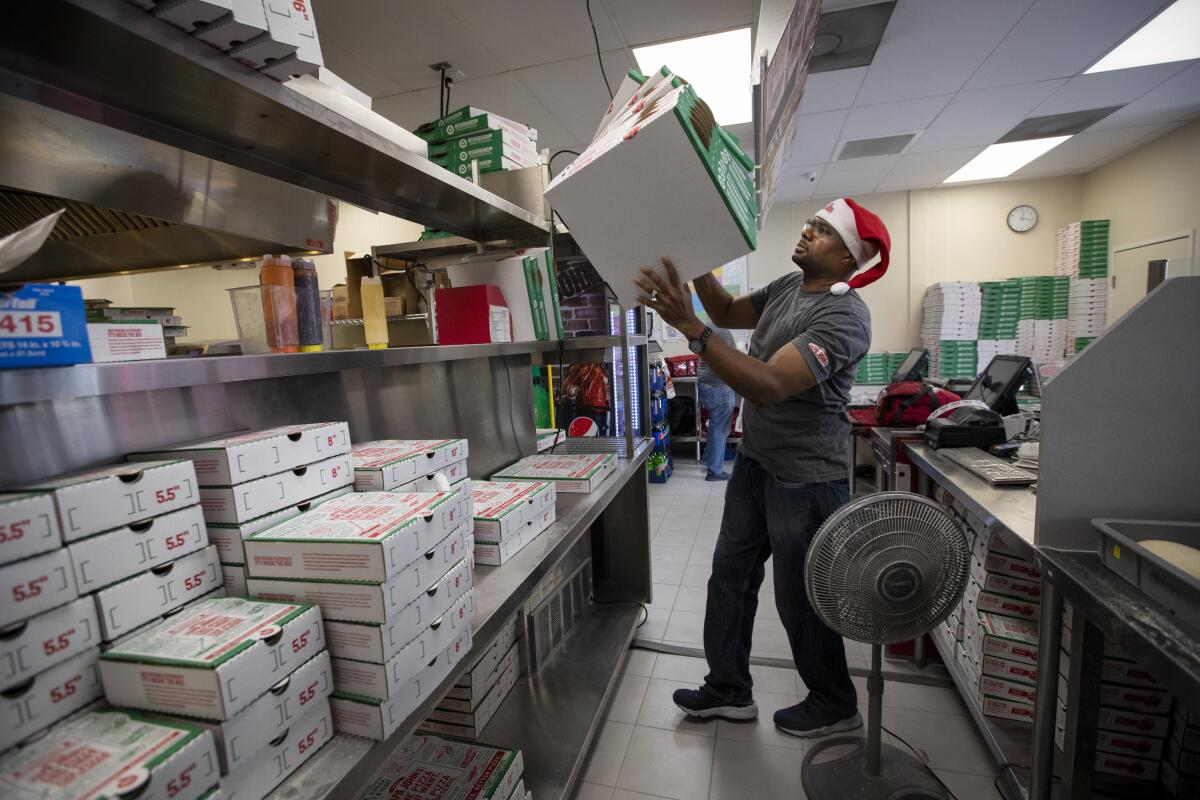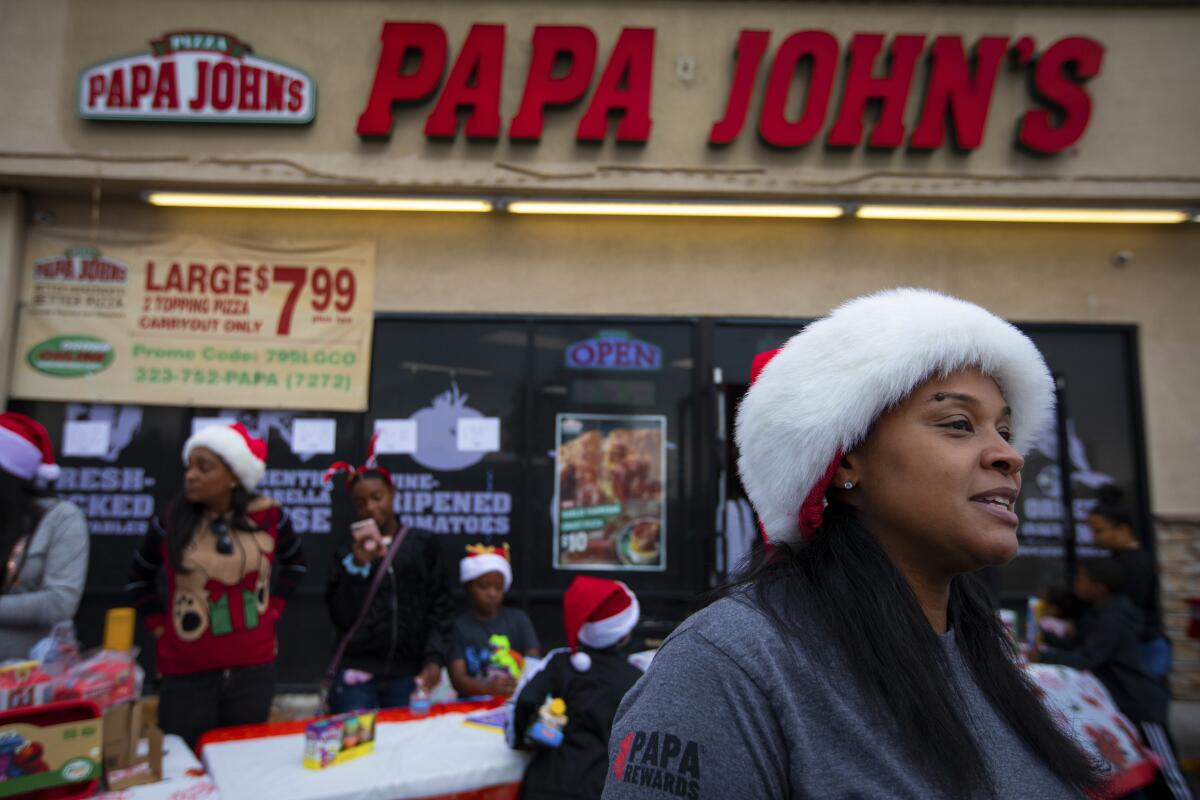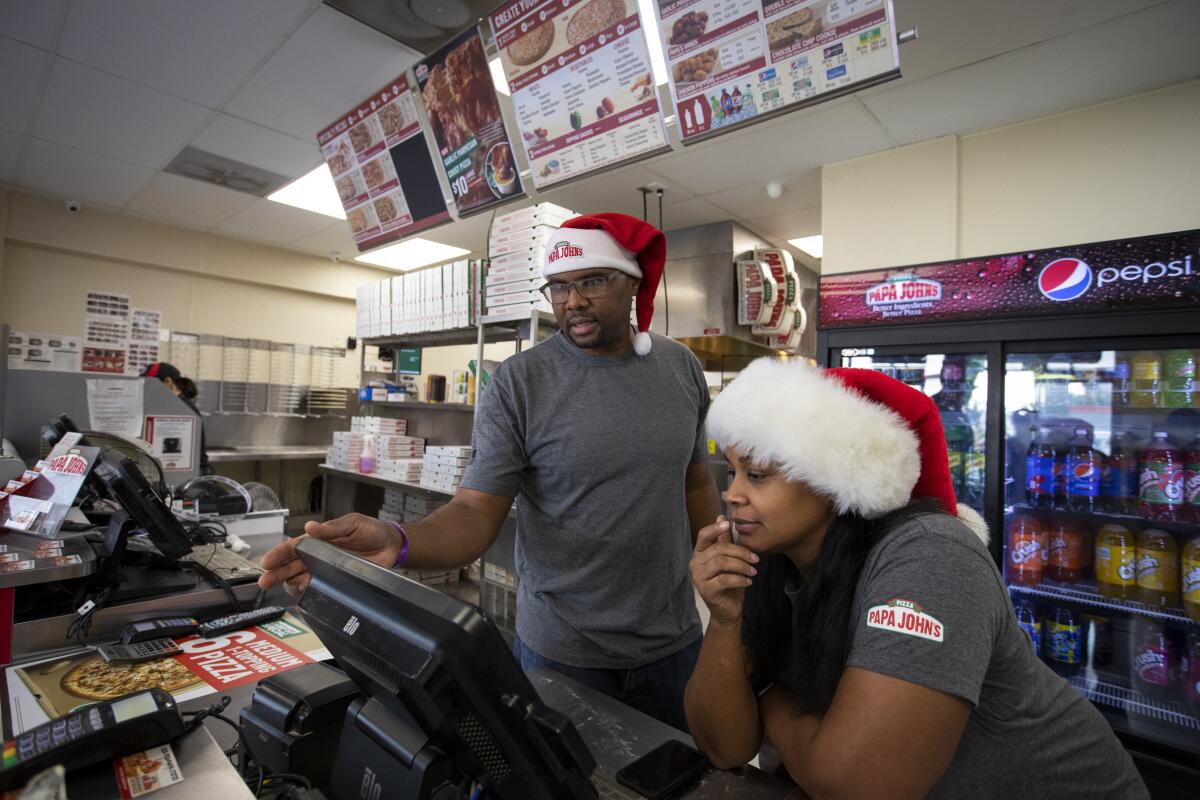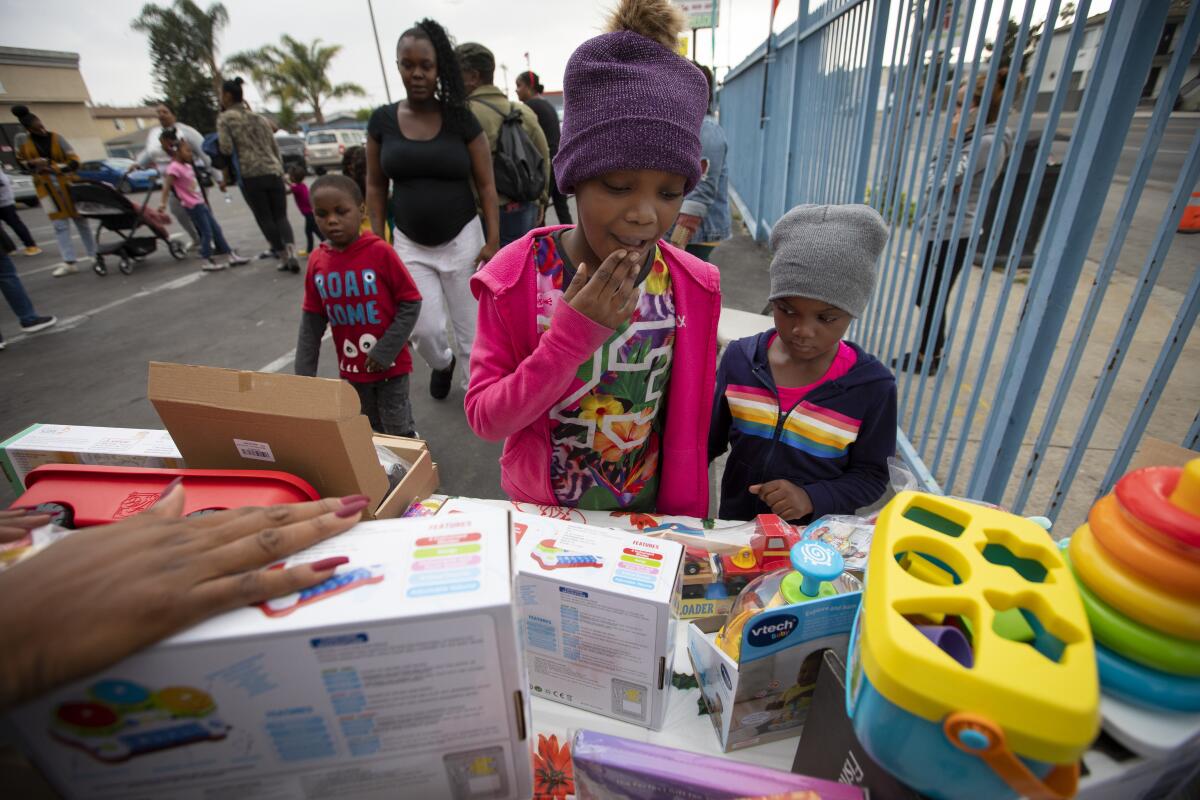They signed a contract on a Papa John’s franchise. Then controversy erupted

- Share via
It seemed like a good idea three years ago, when Jarvis and Josslyn Young first considered opening a Papa John’s pizza franchise in South Los Angeles.
The View Park couple — he’s an aerospace engineer, she’s a real estate broker — figured it would help support their growing family, bring a fresh dining option to a neglected neighborhood and satisfy Jarvis’ craving for the pizza he’d loved since he was a UCLA student two decades ago.
For the record:
6:29 p.m. Jan. 13, 2020The headline has been changed to more accurately reflect the local debate surrounding the opening of a Papa John’s franchise. The column has been updated to reflect comments from John Schnatter, Papa John’s founder and former chief executive.
Because Papa John’s didn’t deliver to their neighborhood, Jarvis had spent years making evening runs to the Culver City outlet, toting an insulated box to keep his pizza hot.
“We started thinking about how nice it would be to have one nearby, then to the idea that maybe we could own one,” he said. “The next thing we knew, we were on our way” to Louisville, Ky., for the training to become franchisees.
Papa John’s was riding high back then. It was the official pizza of the NFL, with legions of devotees, when the Youngs signed on in 2017.
But the ink was barely dry on their franchise contract when racially offensive remarks by Papa John founder and Chief Executive John Schnatter turned the pizza chain into a national pariah.
In November 2017, Schnatter launched a tirade against the NFL for not cracking down on players’ take-a-knee protests against police brutality. He blamed his chain’s declining pizza sales on the turmoil the protests provoked.
Schnatter didn’t single out black players, but we knew what he meant. I remember feeling outraged by his arrogance: The protests should have been “nipped in the bud,” he said, to avoid “polarizing the customer.”
The furor his remarks generated forced Schnatter to step down as CEO. But several months later, as chairman of Papa John’s board, he drew fire again for using a vile racial epithet on a conference call that had been convened to help clean up his image.
When asked how he would distance himself from racist groups online during the recorded call, Schnatter complained that he was being unfairly scrutinized. “Colonel Sanders called blacks …,” using the n-word, and escaped public backlash, he claimed.
Once his language became public, Schnatter apologized, resigned from the board and severed his ties with the pizza chain he’d launched 35 years ago in his father’s bar.
In a letter to The Times following publication of this column, Schnatter said his comments were mischaracterized. He said he did not launch a tirade but criticized the NFL for “poor leadership” and said “there was never a whiff of bias or prejudice in my comments.” He claimed the use of the n-word during the call was a paraphrase of a third party. He noted his “disgust for the use” of the word.
◆
By the time the second scandal broke in the summer of 2018, the Youngs were already in business. The n-word episode reignited fury and customers stopped coming. Their sales dropped immediately, by more than one-third.
The Youngs had considered backing out of the franchise deal when Schnatter made the comment. “I knew why people were angry,” Jarvis said. “We felt the same way.... We would never want to be connected to something so disrespectful, something racist,” he said of the controversy.

But they had made a high-stakes commitment and couldn’t afford to lose the money they’d already invested. The franchising fee alone was $25,000, and other costs could exceed $300,000.
They took to heart Papa John’s response: The company had moved decisively to dump Schnatter, added NBA legend and former Laker Shaquille O’Neal to its corporate board and promised to support new franchisees.
Ultimately, the couple realized this was about more than pizza or profit. They’d both grown up in nearby Inglewood and wanted to be local role models, “to show that you can come from disadvantage and own your own business, chart your own course,” as Jarvis put it.
“We thought about this as a test of our personal philosophy,” he said. “Do you fold up, or do you see it through?”
So while white supremacist websites were calling Papa John’s the “official pizza of the alt-right,” Jarvis and Josslyn Young were setting up shop in a black neighborhood and hoping customers would have their back.
◆
The Youngs’ store opened in February 2018 in a cramped strip mall on Crenshaw Boulevard near Hyde Park. Josslyn willed herself to be optimistic. She scoured the neighborhood for local hires. On social media she posted cheery “Grand Opening” invites.
But the response was swift and harsh. “There were so many nasty comments,” she recalled. “Don’t bring that racist company to our area. Why would black people want to own a franchise of racists?”
The ferocity of the attacks stunned her. “I had no idea what this would do to our business,” she said. “I was actually pretty excited, thinking that once people saw our faces, we could make this thing turn around.”
But when she shared that excitement with friends, they shut her down. “They kind of looked at me like, ‘Papa John’s? Are you kidding?’”
Some of her friends eventually lent support, but the community’s outrage was loud and prolonged.
The Youngs were cast as turncoats, propping up a company now known for the bigotry and bluster of its former leader, not its signature pizza.

People threw rocks at their delivery trucks and harassed their drivers. “They were cussing and honking their horns, saying, ‘Get out of the community! We don’t want you here!’” Josslyn recalled.
“Boycott Papa John’s” became an agenda item at community meetings. The Youngs would show up and make their case to angry neighbors. Most agreed not to call for a boycott but said they would never patronize their place.
“It’s been frustrating,” Josslyn admitted as she worked the counter in a Santa hat last month, one week before she was scheduled to give birth to the couple’s third child.
They’ve been on the grind for 22 months now. And some days it does feel as if a turnaround is on the horizon. New customers continue to trickle in.
Strangers admire their commitment to hiring locals that other businesses won’t, including recovering addicts and ex-convicts. Neighbors appreciate their donations to schools and community groups, and the toy giveaway and Santa visit they host every December.
“We’re moving past it,” Josslyn told me as she handed out gifts at the Christmas party. “Doing things in a way that was our goal from the jump: Serving the community.”

◆
The entire company bore the brunt of Schnatter’s remarks. About a quarter of Papa John’s franchises failed to turn a profit last year, analysts said. New CEO Rob Lynch, who took the reins in August, told me the company is spending $40 million to help struggling franchisees.
“They’re losing school lunch accounts because school districts don’t want to be affiliated with our brand anymore, because of what John [Schnatter] did,” Lynch said.
And in the irony of unintended consequences, the fallout was particularly harsh for black employees and franchisees like the Youngs.
“We have African American employees working in a lot of our restaurants,” Lynch said. “We feel bad when they can’t even wear their uniforms to work and be proud of the company. They didn’t do anything to deserve that.”
That’s what persuaded Shaquille O’Neal to get involved. Like Jarvis Young, Shaq has been a fan of Papa John’s pizza since college. After Schnatter left the company, O’Neal reached out and asked to join the board. He also invested in nine Atlanta franchises.
“These franchisees put their heart and soul into this business,” he told me. “It’s not fair that they’re affected by what this one man said.”
I asked Shaq the same question the Youngs’ neighbors asked them. How does he handle the criticism his role with Papa John’s provokes: You’re a sellout, a lackey, an apologist for racism.
“I heard it a lot,” he acknowledged. “People say, ‘Man, what are you doing?’ I just try to explain, it’s under new leadership, it’s a different board, we’re going to make sure this never happens again.”
That’s a noble promise, but one that’s hard to keep. You can’t clean out all the bigots or scrub away the biases that animate our actions on the job.
Ask Starbucks or Nordstrom or Sephora. On any given day, any company might be just one rude clerk or tone-deaf CEO away from notoriety that’s hard to move past in today’s unforgiving cancel culture.
I understand the impulse to wipe Papa John’s off the map. I could add it to the list of companies I don’t patronize and shows I won’t watch. But I also feel encouraged by the remedies they took — and empowered by the message that angry customers sent.
I know that despite the textbook-perfect corporate response, the psychic pain that lingers on the streets is hard to disperse.
People I talked to at the Christmas party who patronize the Youngs’ shop didn’t want to give their names; that reflects the depth of the anger that still surrounds them.
At this point, boycotting is counterproductive and apt to discourage other would-be business owners, they say. The bad man is gone. The pizza is good. And the company’s transgressions are almost 2 years old.
Influential folks are offering support. When a profile of the couple in a black community newspaper, the Los Angeles Standard, drew snarky comments on social media, publisher Jason Lewis came to their defense:
“We should get behind the Youngs because they are exactly what we complain that we don’t have in our communities,” Lewis wrote. “They stepped up, took the risk, and put their money where their mouth is.”
Still, I can’t help but wonder whether outrage has an expiration date. Can you punish the guilty yet insulate the innocent from blame? How long does it take for a stain to fade?
I was thinking of that as I left my visit to the Youngs’ Papa John’s with a pizza in hand. I’d never tasted the brand.
I stopped by my daughter’s to share it with my pizza-loving son-in-law. He took one look at the box and laughed. “It’s the n-word pizza,” he called out. Then he grabbed a slice and gobbled it up.
More to Read
Sign up for Essential California
The most important California stories and recommendations in your inbox every morning.
You may occasionally receive promotional content from the Los Angeles Times.














